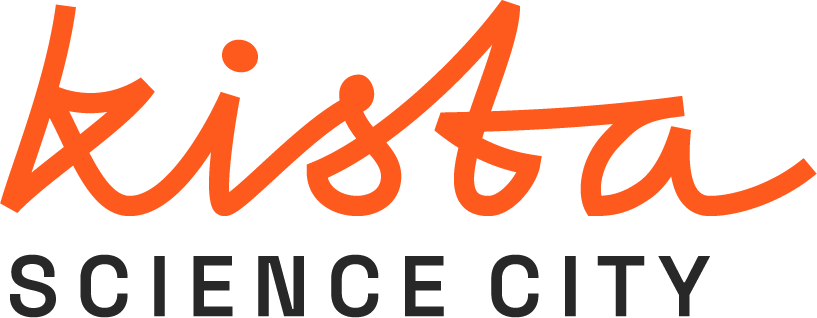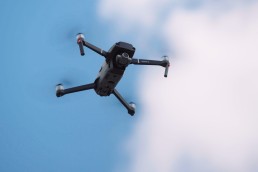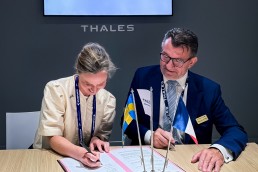Kista takes the lead in smart drone services
Drones will soon be serving customers, citizens, businesses, and authorities with a wide range of revolutionary new services.
Kista Science City hosts one of Sweden’s largest knowledge clusters when it comes to new mobility. A new project will prepare cities for the next phase in this fast-growing drone economy. The tech scene in Stockholm has millions of reasons to get excited.
Drone-based services are expected to be game-changing in the coming years: The potential is enormous in areas as medical transport, emergency response, traffic monitoring and delivery of food and packages, just to name a few. On top of that: using drones can be both effective and sustainable.
But implementing this at a large scale is complex. While the technology for drone services advances quickly, the ecosystem needed for the” lower airspace mobility revolution” isn’t in place. Yet.
That’s what’s most probably about to change in the upcoming years, as the drone market is expected to boom by 2030.
Funding, expertise and tests
Stockholm will take a leading role in a three-year project to identify, test, and evaluate solutions linked to urban drone services in European cities.
The goal is to develop tools for adapted urban planning, to evaluate lifting and landing sites in an urban environment, and to build an ecosystem that pave the way for drone traffic to become part of a multimodal transport system.
The City of Stockholm is collaborating with Kista Science City and the Swedish Air Navigation Services in a consortium that will be focusing on funding, expertise, and implementation of tests.
– New strategies and tools are needed to be able to handle the increasing number of drones in urban areas. We are extremely proud that Stockholm has been selected as one of three European cities to actively lead the development of shaping the future of mobility, says Karin Bengtsson, CEO, Kista Science City.
Contact us if you want to be part of the new drone economy
If you are a tech startup developing products or services related to drones, contact us (Eleonor Sjödin Turah), to be in the loop.
The startup Aerit is one of the tech companies part of this fast-growing eco-system. Founder and CEO, Alexander Perrien, feels the vibrating excitement for drone services in Kista:
– Most companies we have met understand the immense economic and social value autonomous robots can bring and are actively working on solutions and supporting products, he says.
Drones bring endless potential for society
Alexander paints a picture of almost endless potential for society as it fully taps into the possibilities:
– Drones themselves are essentially highly mobile sensor suites, and there is little that prevents us from offering the data we collect as a service in the future. Imagine on the way back from dropping off groceries to a local balcony, the drone stops by a local water reservoir to scan for excess nutrients, sample the air near a local production facility, or update a 3D map of new development. Highly accurate hyper-local data can be provided on demand.
– We are building a future where, at the tap of a button, businesses and individuals alike can send anything anywhere around the globe through a series of coordinated purpose-built autonomous solutions.
About the project “Preparing Cities for Air Mobility – CITYAM
* 13 partners from industry, academia, and cities collaborate on behalf of the Interreg Baltic Sea Region. Over three years, these will test, evaluate, and prepare sustainable solutions for lower airspace mobility in Europe’s cities.
* Stockholm will have a leading role together with Helsinki and Hamburg.
* Lars Strömgren, traffic commissioner in the Stockholms stad says: ”The capital of Sweden must be equipped for future mobility services. The development of drone deliveries is going at rocket speed right now. Therefore, we will investigate how drones could best be used in Stockholm and what rules they would require. We will also develop a plan for possible landing sites and carry out a pilot project with drones in an urban environment.”
* Billy Josefsson, Research & Innovation Urban Air Mobility, Luftfartsverket, says: ”This is really good for the industry, we need champions like the City of Stockholm. The arguments, needs for competence, and solutions identified in CITYAM and for Stockholm will be a valuable contribution to the entire national transition of gradually introducing technology, formulating rules and starting to use drone services. There is so much societal benefit to be gained, the challenge ahead is to build competence and to find good forms of collaboration between the actors.”
Related Articles
July 3, 2025
Thales and Kista Science City launch Nordic cybersecurity partnership
A new national initiative designed to boost Sweden’s semiconductor sector…
June 30, 2025
Opening doors for Swedish tech: Lessons from Access UK
The boundaries of conflict are shifting. Today, national security isn’t just…
June 9, 2025
Kista companies invest early in future tech talent
The boundaries of conflict are shifting. Today, national security isn’t just…




